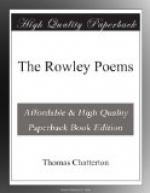10. ALUSTE. H. 1. 88.
That Alured coulde
not hymself aluste.
11. ALYNE. T. 79.
Wythe murther
tyred he flynges hys bowe alyne.
12. ALYSE. Le. 29.—G.
180.
Somme dryblette
share you shoulde to that alyse.
Fulle twentie
mancas I wylle thee alise.
13. ANERE. AE 15.—Ep.
48.
And cann I lyve
to see herr wythe anere?
——Adieu
untylle anere.
14. ANETE. p. 281. 64.
Whych yn the blosom
woulde such sins anete.
15. APPLINGS. E. I. 33.
Mie tendre applynges
and embodyde trees.
16. ARROW-LEDE. H. 1. 74.
Han by his soundynge
arrowe-lede bene sleyne.
17. ASENGLAVE. H. 1. 117.
But Harold’s
asenglave stopp’d it as it flewe.
18. ASLEE. AE 504.
That doest aslee
alonge ynn doled dystresse.
19. ASSWAIE. AE 352.
Botte thos to
leave thee, Birtha, dothe asswaie
Moe torturynge
peynes, &c.
20. ASTENDE. G. 47.
Acheke the mokie
aire and heaven astende.
I stop here, not because the other Letters of the alphabet would not afford a proportionable number of words which might be referred to this head, but because I think these sufficient for my purpose. I proceed therefore to set down an equal number of words under the second general head.
1. ABOUNDE. H. 1. 55.
His cristede beaver dyd him smalle abounde.
The common sense of Abound, a verb, is well known; but what can be the meaning of it here?
2. ALEDGE. G. 5.
Lette notte thie agreme blyn ne aledge stonde.
Aledge, or Alege, v. Fr. in Chaucer signifies to alleviate. It is here used either as an adjective or as an adverb. Chatterton interprets it to mean idly; upon what ground I cannot guess.
3. ALL A BOON. E. III. 41.—p. 23. l. 4.
All-a-boon, fyr Priest, all-a-boon.
Thys ys the onelie all-a-boone
I crave.
Here are three English words, the sense of which, taken separately, is clear. As joined together in this passage they are quite unintelligible.
4. ALLEYN. E. I. 52.
Mie sonne, mie sonne alleyn ystorven ys.
Granting alleyn to be rightly put for alone, no ancient writer, I apprehend, ever used such a phrase as this; any more than we should now say—my son alone for my only son. 5. ASCAUNCE. E. III. 52.
Lokeynge ascaunce upon the naighboure greene.
The usual sense of ascaunce in Chaucer, and other old writers, has been explained in a note on ver. 7327. of the Canterbury Tales. It is used in the same sense by Gascoigne. The more modern adverb ascaunce, signifying sideways, obliquely, is derived from the Italian a schiancio, and I doubt very much whether it had been introduced into the English language in the time of the supposed Rowley.




